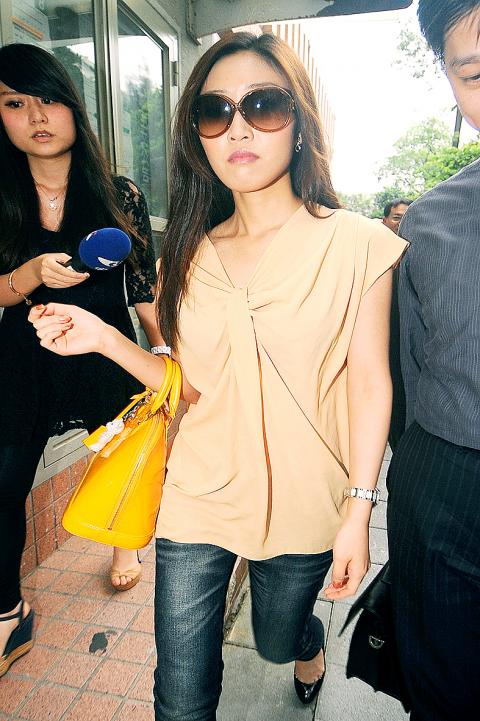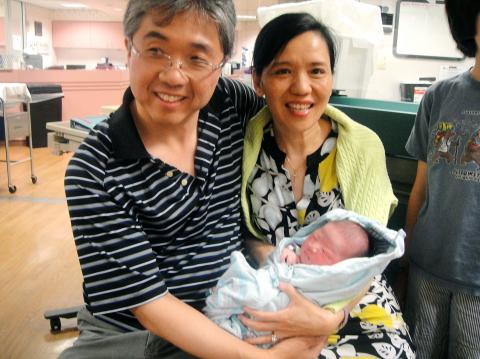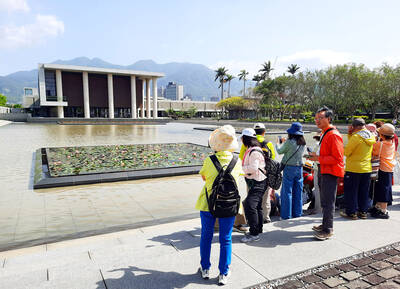Carina Lau (劉嘉玲) has suffered more than her share of hardship, but the actress is eager to let the public know she has moved on. In 1990, Lau was kidnapped, allegedly by gangsters angered by her refusal to take part in a film. Her captors forced her to pose for several topless photos, which remained out of the public eye until East Week (東週刊) magazine published them in 2002. The release of the shocking pictures, which showed Lau crying, caused a massive furor over media ethics in Hong Kong and forced the magazine to cease publication for a year.
In a display of public forgiveness, however, Lau recently granted East Week an interview. Though she has steadfastly refused to describe her ordeal in detail, Lau divulged that the publication of the photos lifted a weight off her shoulders.
“I was constantly waiting for that bomb to go off. When it finally did, I felt a sense of relief. I didn’t feel degraded,” she said. Lau added that she has moved past the trauma of the kidnapping and come to terms with the constant spotlight on her personal life.

Photo: Taipei Times
Lau and longtime love Tony Leung (梁朝偉) ended years of speculation about their relationship when they wed in 2008. Lau says she tries to see the media obsession with her love life as flattering instead of intrusive, but she is now subject to a different kind of scrutiny: the celebrity bumpwatch.
Dismissing rumors that the couple have desperately prayed for a child, Lau said she and Leung are happy being a family of two and have not pursued fertility treatments.
The stork has yet to arrive at the Lau-Leung household, but it made a stop at the home of Jeanette Wang (王芷蕾). When news broke last week that the singer is now the mother of a baby son, many assumed that the 54-year-old gave birth herself. Some reports even went so far as to declare that Wang set new medical reports and compared her to actress Brigitte Lin (林青霞), whose second child was born when she was 45.

Photo: Taipei Times
Wang, who is currently living in the US, quelled the furor with an email to media outlets stating that a gestational surrogate carried her baby. For many years, Wang wrote, she and husband James S. Cheng (鄭叔霆) had pursued fertility treatments without success. The couple said that their new child, named Joshua, is biologically theirs, but that they have also taken all steps to make sure that the pregnancy was in accordance with surrogacy laws.
In far less happy news, new developments continue to emerge in the Justin Lee (李宗瑞) sex video scandal. Lee, son of Yuanta Financial Holdings (元大金融控股公司) director Li Yueh-tsang (李岳蒼), has been accused of drugging and sexually assaulting many of the women shown in the tapes.
Despite the allegations, Lee’s girlfriend Liu Shao-I (劉韶儀) is standing by her man. Last week Next Magazine (壹週刊) published a report stating that Liu planned to confront Lee over NT$30 million of her money that he lost in the stock market. Our sister newspaper The Liberty Times (自由時報) reports that in a meeting with prosecutors, Liu adamantly insisted the report was false and all of Lee’s investments had been made with her agreement.

When the South Vietnamese capital of Saigon fell to the North Vietnamese forces 50 years ago this week, it prompted a mass exodus of some 2 million people — hundreds of thousands fleeing perilously on small boats across open water to escape the communist regime. Many ultimately settled in Southern California’s Orange County in an area now known as “Little Saigon,” not far from Marine Corps Base Camp Pendleton, where the first refugees were airlifted upon reaching the US. The diaspora now also has significant populations in Virginia, Texas and Washington state, as well as in countries including France and Australia.

On April 17, Chinese Nationalist Party (KMT) Chairman Eric Chu (朱立倫) launched a bold campaign to revive and revitalize the KMT base by calling for an impromptu rally at the Taipei prosecutor’s offices to protest recent arrests of KMT recall campaigners over allegations of forgery and fraud involving signatures of dead voters. The protest had no time to apply for permits and was illegal, but that played into the sense of opposition grievance at alleged weaponization of the judiciary by the Democratic Progressive Party (DPP) to “annihilate” the opposition parties. Blamed for faltering recall campaigns and faced with a KMT chair

Article 2 of the Additional Articles of the Constitution of the Republic of China (中華民國憲法增修條文) stipulates that upon a vote of no confidence in the premier, the president can dissolve the legislature within 10 days. If the legislature is dissolved, a new legislative election must be held within 60 days, and the legislators’ terms will then be reckoned from that election. Two weeks ago Taipei Mayor Chiang Wan-an (蔣萬安) of the Chinese Nationalist Party (KMT) proposed that the legislature hold a vote of no confidence in the premier and dare the president to dissolve the legislature. The legislature is currently controlled

Dull functional structures dominate Taiwan’s cityscapes. But that’s slowly changing, thanks to talented architects and patrons with deep pockets. Since the start of the 21st century, the country has gained several alluring landmark buildings, including the two described below. NUNG CHAN MONASTERY Dharma Drum Mountain (法鼓山, DDM) is one of Taiwan’s most prominent religious organizations. Under the leadership of Buddhist Master Sheng Yen (聖嚴), who died in 2009, it developed into an international Buddhist foundation active in the spiritual, cultural and educational spheres. Since 2005, DDM’s principal base has been its sprawling hillside complex in New Taipei City’s Jinshan District (金山). But